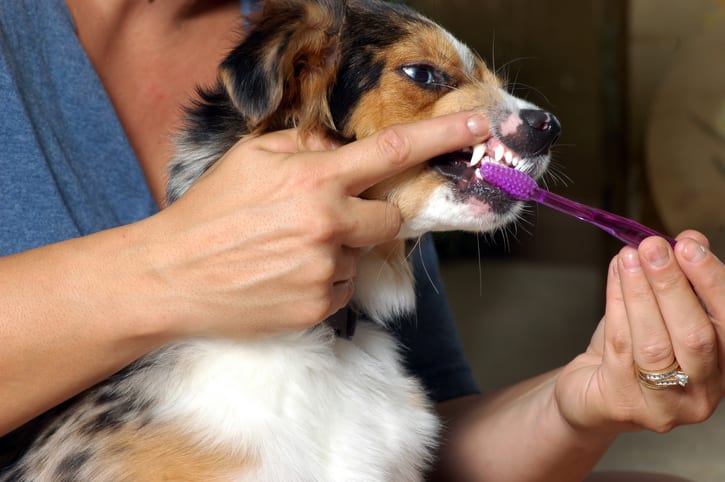How to Clean Your Dog’s Teeth in Amesbury, MA
All devoted dog owners know how important good oral hygiene is to the quality of life that their pets lead. If you’ve ever owned a dog, and even if you haven’t, you are familiar with how bad and intense the smell of a dog’s breath can be. Stinky breath, however, is not the only consequence of neglecting to establish a good dog teeth cleaning routine for your furry friend. Healthy teeth help ensure a strong immune system and aid in maintaining the balanced nourishment of your dog’s body.
Eliminating Periodontal Disease With Dog Teeth Cleaning
According to the American Animal Hospital Association (AAHA), since dogs are fully grown by the time that they reach two—sometimes three—years of age, they usually develop periodontal disease, even if very mild, by then. You may not even notice any oral health problems your dog is developing right away, especially if he or she is still a puppy, but dental issues can really decrease the quality of life for your pet. Healthy teeth make for happier dogs. Dogs are more confident and even smile more often when their teeth are in good shape—just like you smile more readily and confidently when you feel good about knowing that your smile reveals white, sparkling, and healthy teeth.
Bad dog breath can be a sign of many things. Besides pointing to periodontal disease and bad oral hygiene, bad breath can indicate unpleasant dietary habits and diseases like:
- diabetes
- kidney disease
- liver disease
Diabetes can sometimes be recognized by a fruity or sweet smell of your dog’s breath. Other symptoms may include frequent urination. This disease is serious, but it is treatable, and it’s important to get in touch with your vet right away if you suspect your pup might have it.
Kidney disease is dangerous and can actually be a symptom of a bigger health problem. It can often be detected by the smell of urine in your canine’s breath.
Liver disease can also be a sign of a more serious issue. In addition to extremely bad and foul breath, the symptoms of liver disease include vomiting, a yellow tint to your dog’s gums, and loss of appetite.
If you think your pup may have developed the conditions described above, immediately going to see your veterinarian or visiting the emergency vet clinic is vital.
Why Dog Teeth Cleanings Are Important
Regularly cleaning and caring for your dog’s teeth will contribute to a long and healthy life for him or her. The length of the natural life of a dog varies a little based on his or her size. Usually, small dogs live longer—up to fifteen or sixteen years—compared to big ones—sometimes not even ten years. All dogs are different, however, and by providing good care for your pup, he or she will live the longest and happiest life possible.
Minty treats, raw meaty bones, and raw food diet are good for your pup’s oral health and help clean dog’s teeth. But feeding him or her healthy goodies is not enough to keep periodontal disease from progressing. Plaque and tartar may be reduced, but they still continue to build up. Proper dog teeth cleaning is key in keeping plaque and tartar in check and ensuring your dog’s mouth is clean and healthy.
As mentioned above, periodontal disease is already developed by the time your pup reaches the age of three. Taking him or her to the vet, getting tartar buildup removed if necessary, and establishing a dog teeth cleaning routine for him is the first step toward healthy teeth and gums.
How To Clean Your Dog’s Teeth
Annual dog teeth cleanings are recommended, and teeth brushing should ideally be done twice daily using a dog toothpaste. Let your dog taste the toothpaste first. You can start off by using gauze to clean his or her teeth. Here are some tips about cleaning your canine’s teeth that you may find useful:
- Use tooth wipes or rub some toothpaste on a piece of gauze, wrap the gauze around your finger, and carefully rub and clean your dog’s gums and teeth. Make sure you really focus on the back molars since that is where tartar builds up most aggressively. Trial rubbings will give your canine a chance to get used to both having a finger in his or her mouth and to the sensation and taste of the toothpaste.
- Don’t forget to make sure that the toothpaste you use is made specifically for dogs. Since there are so many types and varieties out there, you can try using different kinds and find one with a taste that your dog likes best. Give a lot of praises and treats to keep him or her calm and cooperative. Most dogs get adapted to getting their teeth brushed without a problem and end up enjoying it and looking forward to it.
- Transition to using a dog toothbrush after a while. You can introduce it after a couple of teeth and gum rubbings. Using the toothbrush can actually turn out to be easier, and a lot of dogs like it.
- Carrots, berries, and raw bones are great for the health of your dog’s teeth. They are also really tasty, and your dog will love them.
Make sure you spend at least thirty seconds on each side of the mouth. While your dog may keep trying to chew on the toothbrush at first, he or she will soon start expecting the teeth cleanings and let you do your job without protesting.
While multiple treats may be necessary throughout the process at first, you will probably only need to give your dog one before and one after cleaning by the time the brushing routine is implemented successfully.
As mentioned above, carrots are really good for your dog’s teeth. The same goes for apple slices, berries, and sweet potatoes. Just like consuming plenty of vegetables is good for you, it’s extremely beneficial to the overall health of your dog as well.
Animal Wellness Magazine has an article about the best diets to ensure healthy teeth in dogs. In addition to raw bones, some of them included cranberries, dill, fennel, grapefruit seed extract, green tea extract, oats, parsley, wild strawberry, etc. Besides regularly brushing your dog’s teeth, these are all great ways to aid the maintenance of your dog’s teeth. Just remember that it’s best to always seek advice from your vet before you introduce new foods to your dog’s diet.
Call (978) 388-3074 to talk with the veterinarians at Merrimac Valley Animal Hospital to establish a dog teeth cleaning routine for your pet!
Recent Posts
About Us
Merrimac Valley Animal Hospital had humble beginnings in 1968. Dr. Walter Brown opened the animal hospital in a garage next to his home near the current hospital and operated out of this small space until the current building was built in 1969.

